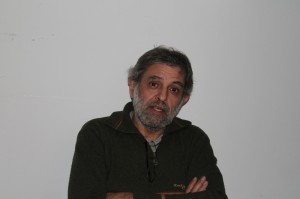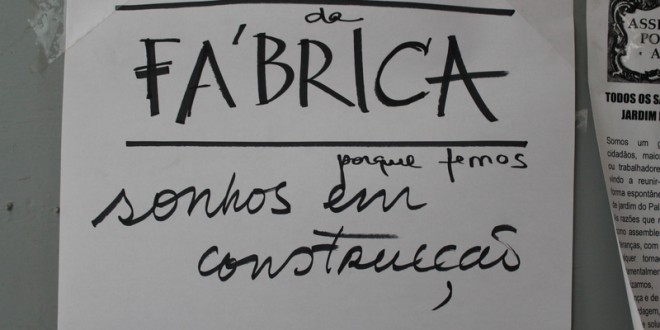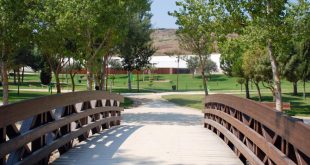João Pestana is an aeronautical communications specialist. After twenty years of working in the Azores, he returned to Lisbon in 2011 and getting involved in various political movements and citizen protest movements. He self-describes himself as somebody “who just cannot stay stopped” and a firm believer in the need for social change. He was one of the drivers behind the Algés Popular Assembly (1) and participates in the community management of one of its projects – the Factory for Alternatives.
ECO123: How did an initiative like the Factory for Alternatives actually emerge?

João Pestana: It emerged out of the Algés Popular Assembly that was founded in May 2013. And it grew until reaching the point of an idea of a space for engaging in activities. We were lucky enough to discover this factory. We talked to the owner, she liked the project, made a more accessible price and we moved ahead.
The idea is not about making money and it never was. This is about being an alternative for people and showing them that if we exchange our knowledge and experiences, we may live in a different way. Whether we are able to achieve this, only the future will tell.
It has been a difficult path. However, we have ever more people coming in, this is taking on a life of its own and we have already doubled or tripled the initial activities. And that’s because we ask people: “We give what we have. And what about you? What can you give to other people?” Whoever knows how to do something, whoever can teach it to others. And there are many people who make suggestions. They give a couple of hours per week and can then draw upon everything else happening.
There are other people who do not know what they can do. We tell them that it doesn’t matter and they can decide later. You have to give people time so that they learn and assimilate and then they themselves become the ones wanting to do.
This is a self-managed space in which everybody may participate. Is this means of operation easy to apply?
In the Assembly, it was relatively easy especially as we work through consensus. Either the idea gains absolute consensus or better just to forget it or postpone it. Whenever nobody openly opposes it (and people do not have to be fervent supporters), then it can be approved. And whenever somebody does oppose an idea then they have to explain why they do. This helps proposals become workable as the parts that are not acceptable get removed. If there is some problem, then resolve it – and those able to do so, do that.
How do you perceive the growth of this project?
My major ambition is that there is a rising level of sharing between people and so that this space becomes utilised almost all day by the maximum possible number of activities. And that this proves to the benefit of people. More than just resolving problems, teaching them how to solve them themselves. If we can do any of that, I think we shall already have achieved a lot.
What do we need to have more projects like this?
The will of people to do so. This only happens out of our shared goodwill.
Are there any values you would never give up on?
Being open to everybody. Being self-managed. The idea of consensus. These are core principles that we have held from the outset. When people come here and we provide them with activities, we only ask them for something in exchange. This means that they also feel this is theirs and that it’s a simple exchange and nothing else.
Do ecology and sustainability represent a concern?
They do. Recycling, separating products, the soap and recycling workshops. We have these principles. I’ve already lost hope in changing the world. However, if we’re able to change my street a bit, I’ll be happy. And if each one of us changes our street a little, we will also have achieved something.
 Eco123 Revista da Economia e Ecologia
Eco123 Revista da Economia e Ecologia


